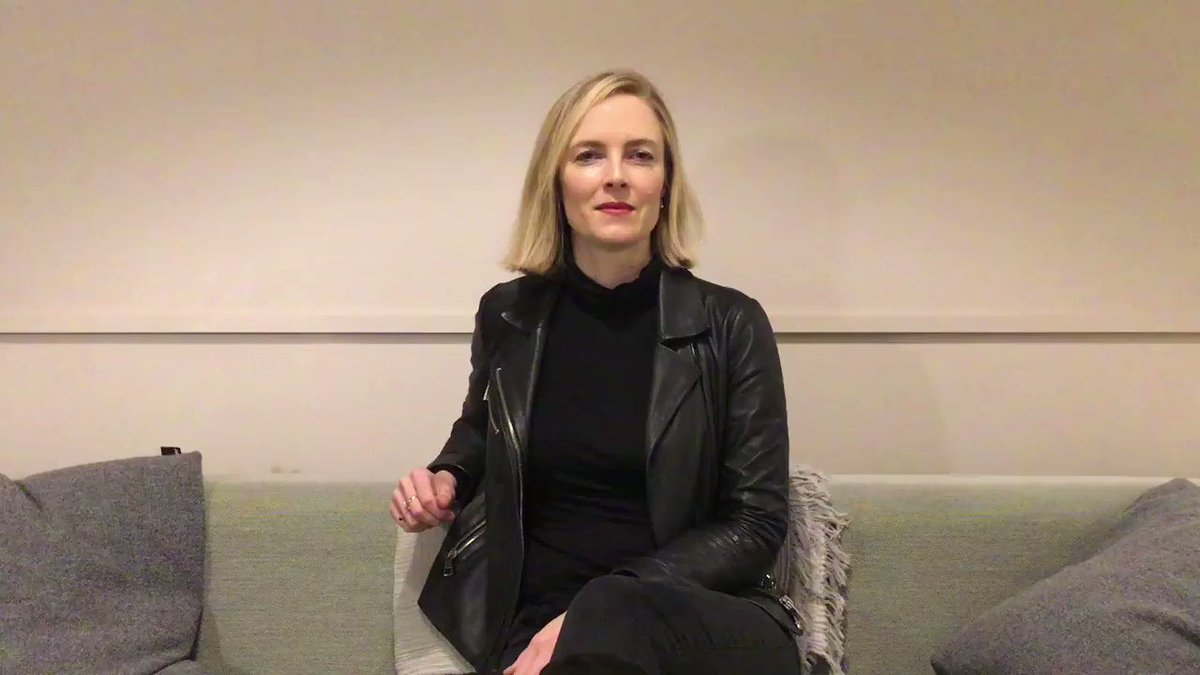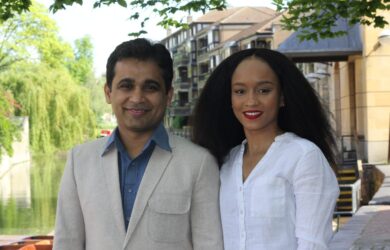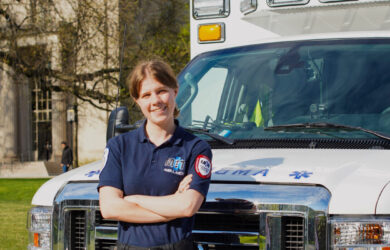
Robyn Scott speaks about her work as co-founder of Apolitical, bringing government workers together to discuss best practice on global challenges.
There are lots of bright spots in government and lots of pioneers. But we’ve ignored them, focusing too much on what isn’t working. So everyone’s forgotten that things do work.
Robyn Scott
Since leaving the University of Cambridge Robyn Scott has led a series of inspiring social enterprises which aim to bring the brightest minds together to find solutions to some of the world’s most pressing challenges – echoing the mission of Gates Cambridge.
For the last three years she has led Apolitical, a peer to peer learning platform for governments which she co-founded.
She says: “We were inspired by the fact that governments face 21st century problems but have been trying to solve them working with a 20th century operating system,” she says. “It seemed crazy that in a world where we can find the best hotel room for our holiday in a few clicks, policy makers could not find out about how people on the other side of the world were dealing with similar problems – at an enormous cost to society in the form of unnecessary mistakes and duplication. At a time of rapid change and rising nationalism, Apolitical also provides motivation and a community of shared purpose. Most public servants – who are the world’s largest workforce – go into government wanting to change society for the better. Our site highlights the hidden heroes in government and humanises the bureaucracy, providing people with an incentive to be innovative and do things differently.”
The platform has grown very rapidly in just three years. Tens of thousands of verified public servants from more than 160 different countries now use the platform to find and share solutions to big global challenges, from gender equality and climate change to ethical AI and cyber security. Apolitical periodically releases peer-nominated top 100s lists of the most influential thinkers and leaders in different policy areas, areas such as climate change and gender policy. Indeed, Gates Cambridge’s Victoria Herrmann [2014], director of the Arctic Council, featured in the climate change list. The aim is to give these leaders greater visibility, greater agency and more budget.
A global network
There are 28 employees working for Apolitical. Most are based in London, but there is a small team in Berlin. The platform is supported by innovation funding from the European Union as well as mission-driven investors in five continents. Apolitical’s government partners include the UK government, the Canadian government and the World Bank.
Robyn says there are many members from Global South countries. “One of our commitments is to be global,” she says. “At least twenty five per cent of everything on the platform is relevant to the Global South.” Reverse innovation in policy is a big focus – similar to what we have seen in poor countries with technology leapfrogs in mobile phones and residential solar energy. Apolitical is keen to showcase similar examples in policy. For instance, Brazil was the pioneer of participatory budgeting, which now occurs in 2,000 locations globally.
The site takes an intersectional approach, which shows the links between different policies, for example, a climate change policy might also be a green jobs policy. Apolitical are also optimistic about the power of government. The experimental psychologist Professor Steven Pinker is an adviser. Robyn notes that many of the first digital natives are now in positions of influence in government and thinking across boundaries. “There is an appetite for doing things differently,” she says.
Optimism
She is hopeful that rising nationalism and challenges to longstanding institutions will galvanise efforts to focus on and accelerate what’s working. “There are lots of bright spots in government,” says. “And lots of pioneers. But we’ve ignored them, focusing too much on what isn’t working. So everyone’s forgotten that things do work.”
Her work for Apolitical includes product strategy, building partnerships with government, fundraising and publicly representing the company.
“Government spends 40 cents in every dollar and employs the world’s largest workforce. It is critical to solving the problems we face today. To give a sense of government’s scale, even the Gates Foundation’s entire endowment would fund London for just two years. So government needs to function well. We believe we can dramatically improve its effectiveness with better skills and knowledge sharing,” says Robyn. She adds that Apolitical’s aim is to improve the effectiveness of at least 1% of government spend by at least 50% to unlock at least $150 billion a year for society.
“Our vision will take 10 or more years to realise,” she adds, “so we’re lucky to be backed by visionary investors who are on board with this ambitious approach. We’re also proud that 50% of our investors are female.”
Apolitical puts a lot of effort into building a diverse and strong culture. For example, employees have recently been involved in a well being experiment which includes taking the last Friday of every month off. The organisation was named one of the top three of 2,000 best companies to work for by Escape the City, which judged companies on factors like mission, impact, innovation and culture. Fast Company also named Apolitical one of the top 10 most innovative companies in social good in the world in 2018.
Robyn’s future plans include developing the Apolitical Foundation and its Academy which started up around two years ago. It offers training fellowships to young and traditionally excluded groups who want to run for office. Some of these fellows are now seeking or have won election. It is also about to launch a global programme for members of the World Economic Forum’s Young Global Leaders (YGLs) and Global Shapers. Robyn was a WEF young global leader six years ago. The Academy’s mission, supporting transformational leaders in government, is similar to that of Gates Cambridge – to “create a dynamic global community of exceptional people with the vision, courage and influence to drive positive change in the world”.
Writing and campaigning
In addition to her work for Apolitical, Robyn, who recently became a mother, has just finished her second book, about a maximum security prison in South Africa where the prisoners transformed their own lives and those of many others by adopting adopted Aids orphans.
It follows her highly acclaimed memoir, Twenty Chickens for a Saddle: The Story of an African Childhood. The book tells of her unconventional childhood in Botswana, growing up with her father who was a flying doctor and being homeschooled by her mother. It has been described as “the nearest thing you will get to Gerald Durrell's My Family and Other Animals in Africa and just as enchanting”.
Robyn has also worked as an ambassador for the Gates Foundation-funded Access to Medicines Index which highlights efforts by pharmaceutical companies to help close the gap in access to medicine between developing and developed countries and encourages them and their stakeholders to do more. It has since spawned similar indexes, such as one around responsible mining. Robyn [2004], whose MPhil in Bioscience Enterprise at Cambridge was on pricing of Aids drugs and the precedent set for other diseases, also set up several social enterprises in Southern Africa supporting vulnerable people affected by Aids and poverty with income generation skills such as coding.
As Gates Cambridge prepares to celebrate its 20th anniversary next year, she says: “The mission of Gates Cambridge – to use the opportunities the scholarships provided to transform society – creates an inspiring debt of responsibility. I hope to live up to that mission in my work.”

Victoria Herrmann
- Alumni
- United States
- 2014 PhD Polar Studies at Scott Polar Institute
- Pembroke College
Victoria is interested in exploring the nexus of climate change, human development, and public policy in the Arctic. Her PhD research focuses on how images and aesthetic codes construct values, identities, and ideas of power in the Arctic since the Second World War. From a young age Victoria's grandfather, a Holocaust survivor, has inspired her to pursue a career promoting social justice and empowerment. During her undergraduate degree, she followed that inspiration through two emerging personal interests - art and environmentalism. Through internships at The Smithsonian Institution and the Metropolitan Museum of Art, she helped to create programs to bring different, often contentious, communities together through museum educational events. At the Untied Nations and the Carnegie Endowment for International Peace, she later worked on research, writing, and advocacy for climate justice, urban resiliency in socioeconomically depressed neighbourhoods, and mitigation. Though passionate about art, climate change, and social justice individually, it was not until her Fulbright research that Victoria was able to bring her three disparate interests together. During her year in Canada, she studied how indigenous civil society groups used visual media to empower their voices at climate change negotiations. At Cambridge, she continues this multidisciplinary approach to scholarship by examining the changing visual narratives of geopolitics in the Arctic and its influence on perceptions of power, justice, and agency. As the Alumni Officer Victoria works closely with the Gates Cambridge Alumni Association to connect the scholar and alumni communities.

Robyn Scott
- Alumni
- New Zealand
- 2004 MPhil BioScience Enterprise
- St Catharine's College












